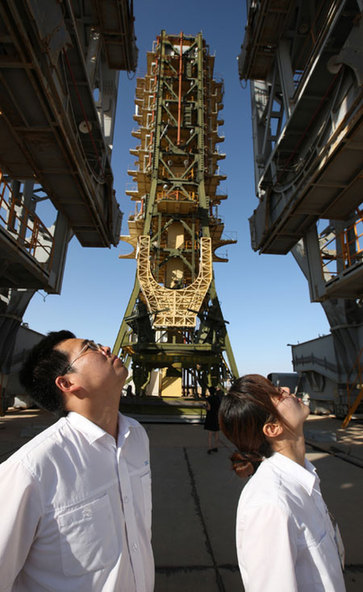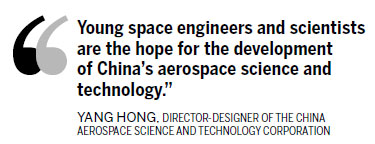Sky is not the limit for young space engineers
Updated: 2012-06-19 08:00
(China Daily)
|
|||||||||||
|
 Jia Lide and his wife, Li Ting, are young engineers working on the launch of the Shenzhou IX spacecraft at the Jiuquan Satellite Launch Center in Jiuquan, Northwest China's Gansu province. The couple has little time to be with their 3-year-old daughter. Wang Jianmin / Xinhua |
Generation born in the '80s plays an important role in nation's space industry
Dressed in his favorite red No 24 jersey with a basketball in hand, people cannot believe 28-year-old Li Wen is an engineer for the Shenzhou IX spacecraft at the Jiuquan Satellite Launch Center.
Besides being called a space engineer, the gentle young man from the Inner Mongolia autonomous region prefers people call him "the Kobe in aerospace city".
Los Angeles Lakers' All-Star guard Kobe Bryant is his favorite basketball player.

Li is just one of thousands of young space engineers in China who devoted themselves to the country's aerospace industry and witnessed the successful launch of the Shenzhou IX on Saturday.
Chinese space engineers are about 15 years younger on average than the average age of the space engineers in other countries, China Central Television reported.
The busy young engineers staring at the big screen and cheering the country's first manned space docking at the Beijing Aerospace Control Center on Monday illustrates that the generation of Chinese born in the 1980s is playing an important role in the aerospace industry.
Liu Ning, 32, director-designer of the China Academy of Space Technology, is the head of the technology department of the Tiangong-1 lab module, and through a simulation has experienced almost all of the activities that astronauts might perform in a module during a space mission.
Liu has even experienced a simulated weightless environment, and was hung upside down from a crane to test whether astronauts would be able to open a door in a weightless environment.
Liu served as a training partner for the three astronauts in the Shenzhou IX spacecraft in October to familiarize them with every button and function in the Tiangong-1 module.
When the Tiangong-1 module was launched, Liu felt a sense of loss.
Unlike Liu, 34-year-old Lu Xinguang, director-designer of the Beijing Aerospace Automatic Control Institute, felt relieved after every successful launch. He has already attended the launch of Shenzhou V, Shenzhou VI, Shenzhou VII, Shenzhou VIII, Shenzhou IX and Tiangong-1 module.
Lu told China Central Television that it felt really good to see the spacecraft flying into the sky.
The booming development and proud feeling of being a space engineer has attracted young people's attention.
Shang Teng, 25, a new researcher at the Beijing Aerospace Automatic Control Institute, told China Central Television that he is very excited to have the opportunity to learn from these young engineers.
"Everyone here loves what he or she is doing. It is the right place for me," Shang said.
In China's space development, the 1980s generation of engineers and scientists are playing an important role.
Mou Yu, 30, deputy director-designer of the China Academy of Launch Vehicle Technology, said it is time for the 1980s generation to contribute to social development. Mou is confident of taking on any challenge.
"Young space engineers and scientists are the hope for the development of China's aerospace science and technology," said Yang Hong, director-designer of the China Aerospace Science and Technology Corporation.
On Saturday, China successfully launched the Shenzhou IX, and on Monday the country's first manned space docking was completed, taking China one step closer to setting up its own space station by 2020.
China Daily - China Central Television
Today's Top News
President Xi confident in recovery from quake
H7N9 update: 104 cases, 21 deaths
Telecom workers restore links
Coal mine blast kills 18 in Jilin
Intl scholarship puts China on the map
More bird flu patients discharged
Gold loses sheen, but still a safe bet
US 'turns blind eye to human rights'
Hot Topics
Lunar probe , China growth forecasts, Emission rules get tougher, China seen through 'colored lens', International board,
Editor's Picks

|

|

|

|

|

|





